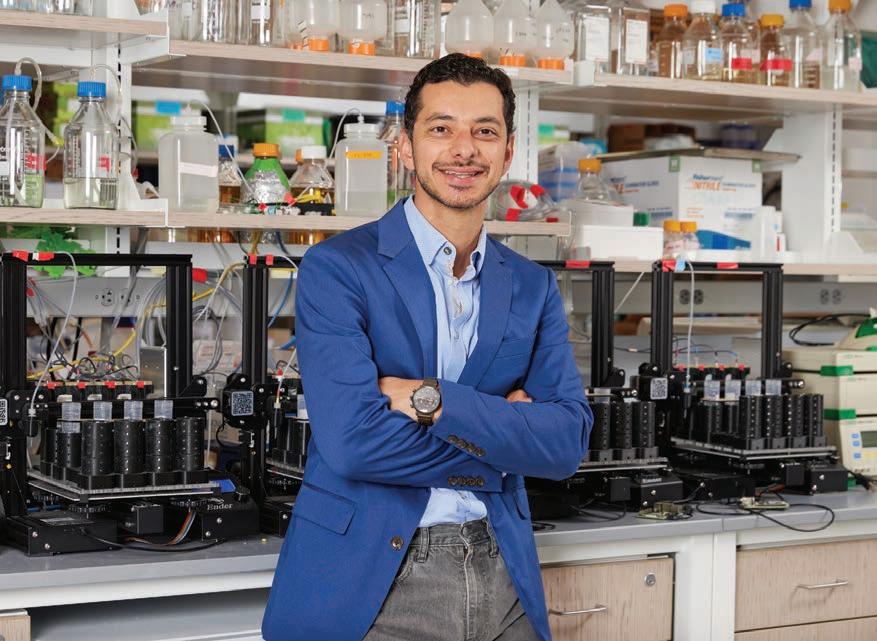
1 minute read
With Keck Funding, BU-UCI Team to Study Cell Signaling
Acontinent-spanning team that includes Associate Professor Ahmad (Mo) Khalil (BME) has received a $1 million award from the W.M. Keck Foundation for a cell signaling study that might lead to heart and pain therapies with fewer side effects.
Khalil and co-PI Chang Liu, associate professor of biomedical engineering at UC Irvine, will develop a platform to create biomolecules that enable the systematic study of biased signaling by G-protein coupled receptors (GPCRs). GPCRs are a large class of membrane proteins used by cells to convert extracellular signals into intracellular responses regulating many physiological functions in the human body, including vision, smell, neurotransmission, the endocrine system and the immune system.
Advertisement
“Deciphering how cells sense and transduce diverse extracellular signals— ranging from light to odorants, hormones and neurotransmitters—is a fundamental problem that touches virtually every area of biology,” says Khalil. “The Keck award will allow us to pursue bold new ideas and technologies that combine my lab’s expertise in synthetic biology and cell signaling with the Liu lab’s expertise in directed evolution to help systematically test and study models of GPCR signaling, such as the notion of biased signaling. I am especially excited to launch this project with my friend and long-term collaborator, Chang Liu.”
In the classical model, GPCRs act as on/ off switches where a ligand turns on or off all signaling from a GPCR. In recent years, however, this classical model has been expanded through the discovery of biased GPCR ligands, biomolecules that do not simply activate or inhibit all signaling but rather, selectively modulate downstream pathways. In effect, this turns a black-and- white signaling paradigm into a “color” picture by adding another dimension to its possibilities, say Khalil and Liu.
However, researchers are limited in their ability to probe this dimension due to the lack of specific and potent GPCR ligands that are capable of triggering biased signaling in desired directions. Khalil and Liu will combine their work on establishing versatile reporters for GPCR signaling with their novel continuous evolution technologies to derive new ligands that induce user-defined signaling profiles for human GPCR targets.
The new ligands will be used to trap medically relevant GPCRs in distinct or previously unseen conformations, enabling structural and biochemical studies to uncover the molecular mechanisms of biased GPCR signaling and the detailed interrogation of multidimensional signaling of many other signaling systems as well.
“GPCRs control almost every aspect of human physiology and the ability to selectively activate certain GPCR signaling pathways over others is hypothesized to have major therapeutic advantages, like treating pain or heart conditions with fewer side effects,” says Liu. “Yet whether this selective activation is possible in a general manner, that is still an open question in the field. We are excited to answer that question by leveraging our continuous protein evolution approaches.”








